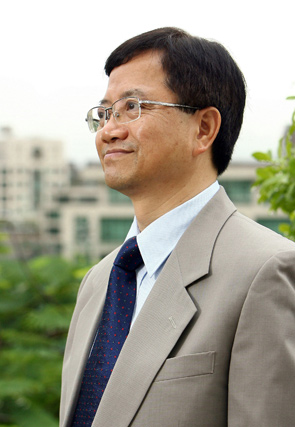
|
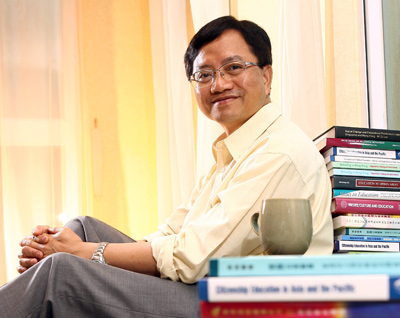 |
| |
| An Outstanding Citizen |
He is a world-renowned scholar in the fields of comparative education, citizenship education, and moral and values education. His academic pursuits, career and community involvement span Hong Kong, the Mainland, the UK, USA and Australia. His belief in citizenship education, deep understanding of the Chinese culture, his international exposure and experience in education have served to prepare this leading scholar to take on a different role at the Institute, when he rejoined us in May 2007. He is Professor Lee Wing-on, Acting President and Vice President (Academic). His brainchild is the HKIEd Development Blueprint and he will form the focus for whom the Institute community can look upon in our quest for a University title.
Three teachers and their lifelong influence |
Reflecting on his own school days, Professor Lee recounts how three teachers in his primary and secondary school days not only influenced his outlook, but also changed the course of his life. The teachers whom Professor Lee speaks so highly of bear several common traits - they nurtured students under a strict regimen but they were well-intentioned and always looked after their students with love and care; they thus commanded a great deal of respect from their pupils.
|
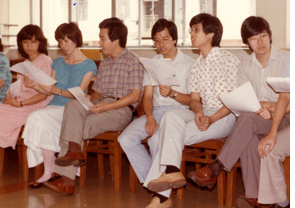 The first teacher was Dr Chan Bing-cho, who taught Professor Lee Chinese in Primary 6. He is also the retired head of the HKIEd's Chinese Department. Professor Lee describes Dr Chan as "strict but soft-hearted". Feeling sometimes frustrated by, and often fearful of Dr Chan at his young age, it took years for Professor Lee to discover that everything his teacher did was for the ultimate good of his students. The first teacher was Dr Chan Bing-cho, who taught Professor Lee Chinese in Primary 6. He is also the retired head of the HKIEd's Chinese Department. Professor Lee describes Dr Chan as "strict but soft-hearted". Feeling sometimes frustrated by, and often fearful of Dr Chan at his young age, it took years for Professor Lee to discover that everything his teacher did was for the ultimate good of his students.
The  second teacher was Ms Lam Leung-ching, who taught Professor Lee Geography for a year. Professor Lee describes himself as an average student who was keen on extra-curricular activities, and unlikely to get into university. But seeing his ability and potential, Ms Lam invited Professor Lee to live in her own home for the last month and a half before his university entrance exams. Her faith was not misplaced - Professor Lee was successfully admitted to the Arts Faculty of The University of Hong Kong (HKU), majoring in Chinese Literature. second teacher was Ms Lam Leung-ching, who taught Professor Lee Geography for a year. Professor Lee describes himself as an average student who was keen on extra-curricular activities, and unlikely to get into university. But seeing his ability and potential, Ms Lam invited Professor Lee to live in her own home for the last month and a half before his university entrance exams. Her faith was not misplaced - Professor Lee was successfully admitted to the Arts Faculty of The University of Hong Kong (HKU), majoring in Chinese Literature.
|
The last teacher whom Professor Lee speaks of at such length is Mr Wu Bing-chiu, who taught him Chinese and Chinese History from Form 1 to Form 7. Outside the classroom, Mr Wu instructed him in Chinese calligraphy and he was also mentor of the Christian Fellowship group. His philosophy towards life, meticulous working attitude and personal integrity cast a lifelong influence on Professor Lee. Given his performance, experience and the wide respect he won at school, Mr Wu was well-qualified for further career advancement. However he preferred to stay close to his students, whom he tended with loving care and strict discipline. Upon his retirement as Vice Principal, students and alumni alike joined hands to throw Mr Wu a warm and heart-felt farewell party. Years later, Professor Lee continues to reiterate that if not for Mr Wu, he would not have become the person he is today nor formed his existing values and judgments. |

|
"I see myself as a facilitator and supporter, and am mindful that the Institute community will participate and be engaged in the consultation process, where fairness and transparency have to be ensured. Only through participation can the Institute community develop a sense of engagement and ownership of the Institute's affairs." |
Citizenship Education:
an academic "specialisation-turned-management" philosophy |
Professor Lee's post-doctoral research areas started with the Faculty of Education at HKU, where he taught Philosophy of Education and Comparative Education. Apart from the then available programmes on education administration and pedagogy, he found that the areas of values education, civic education and moral education were missing. He thus began delving into these subjects himself. The research opened up new horizons for him and resulted in the introduction of a Master's programme in Values Education, which he heralded at HKU's Faculty of Education in 1994. The new programme brought him a great deal of attention from the education sector as well as the government in the pre-handover period. |
In 1995, he was invited to serve as a member of the Committee on the Promotion of Civic Education, becoming a key drafter of two chapters - Concepts and Curriculum - in the Guidelines on Civic Education in School. In the final days before Hong Kong's handover, the promotion of civic education was often the subject of heated debate between the different camps advocating either human rights or national education. Saddened by the political bickering and yet feeling that his role as a scholar could fill the gap, Professor Lee worked hard to adeptly turn the controversy into an intellectual discourse, where both propositions could find a balancing point. With the accomplishment of this task, Professor Lee was invited that same year to the IEA-organised International Conference on Civic Education attended by delegates from 28 countries. He subsequently joined the IEA Civic Education Study as a member of its International Steering Committee. |
In his new role as Acting President and Vice President (Academic), his belief in citizenship education continues to underpin his management philosophy. |
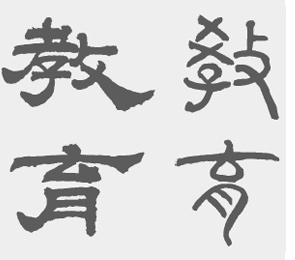 Left: Professor Lee masters the sophisticated art of Chinese calligraphy, thanks to the tutelage of Mr Wu Bing-chiu. Left: Professor Lee masters the sophisticated art of Chinese calligraphy, thanks to the tutelage of Mr Wu Bing-chiu.
Hong Kong Education
As an internationally renowned scholar, Professor Lee has a number of incisive comments on education in Hong Kong. Having worked and studied in the west, he frequently comes across overseas educators who speak highly of Hong Kong students. They are top performers, particularly in mathematics and other science-related subjects. It is not unusual for the public exam grades of Hong Kong's students to be upwardly adjusted to reflect the high standards achieved, when measured against similar levels in western countries. As such, Professor Lee calls on the Hong Kong community to be fair, and be more appreciative of what the education system has achieved for our children.
|
| His vision for HKIEd |
| Teaching staff |
Dedicated teaching staff form the force behind the HKIEd's improvements over the years. They have soldiered on tirelessly, completing numerous evaluation and validation exercises, while at the same time working to upgrade their own academic qualifications and research capabilities. In comradeship with his peers, Professor Lee works closely with his colleagues for whom he has a great deal of respect. In his new position, he hopes to be able to help and support his colleagues to gain the recognition of the community. He is also looking forward with enthusiasm to their partnership in achieving the Institute's next target - the quest for a University title. |
|
| Students |
As Hong Kong turns into a knowledge-based society and faces an increasingly globalised economy, where knowledge learned at school could be outdated upon graduation, Professor Lee's primary concern is to ensure that our students will learn "how-to-learn". Equally important is to ensure that students will develop an international outlook, a broader understanding of the society beyond the school environment, as well as excellent problem-solving skills. |
|
| The Institute |
The Institute community, as a whole, needs to have confidence in our strengths and to hold a bold vision with an actionable mission. This conviction is crucial to rallying external support from the different sectors of the community. We have received tremendous recognition for our achievements from our counterparts locally, internationally and from the Mainland. These positive remarks will be reflected to the government in our quest for a University title. |
|
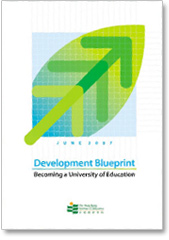 |
| The Development Blueprint |
The vision that Professor Lee and the Institute community upholds, has been articulated into the Development Blueprint, which was submitted to the government on 28 June 2007. Hand-in-hand with the submission, the Institute has been working to put the plans outlined in the Blueprint into full swing with the different strategic initiatives to be rolled out in phases. |
|
|
| Achievements |
Career
 |
| ĦE |
2007
Acting President and Vice President (Academic) |
| ĦE |
2005-2007
Professor of Education, Faculty of Education and Social Work, University of Sydney
|
| |
Director (International), College of Humanities and Social Sciences, University of Sydney |
| ĦE |
1998-2005
Founding Dean, School of Foundations in Education, HKIEd |
| |
Co-head, Centre for Citizenship Education, HKIEd
|
| |
Head, Department of Social Sciences, HKIEd
|
| |
Head, Department of Educational Policy and Administration, HKIEd |
| ĦE |
1994-1998
Director, Comparative Education Research, Faculty of Education, The University of Hong Kong |
| |
Chairman, Hong Kong Centre for IEA Studies, Faculty of Education, The University of Hong Kong |
| |
Associate Professor of Education and Associate Dean of Education, The University of Hong Kong |
Honours
 |
| ĦE |
2003
The Medal of Honour, awarded by the HKSAR Government |
| |
| |
Bronze Education Award and Education Innovation Award, presented by the Educational Art Research Association and the Educational Development Forum in Beijing |
|
Community Service
 |
| ĦE |
1995-1998
Member of the Steering Committee, Quality Education Fund, Hong Kong
|
| |
Member of the Committee on the Promotion of Civic Education
|
| |
Key drafter of the conceptual and curriculum framework for Guidelines of Civic Education in School |
| |
Member of the committee designing the civic education subject syllabus for junior secondary schools |
| ĦE |
1995-2002
Member of the International Steering Committee, International Association for the Evaluation of Educational Achievements (IEA) Civic Education Study |
| |
Member of the moral education committee of the China Educational Research Association |
| ĦE |
1995-date
Chair / Advisor / Member of various Government Committees and Sub-Committees, including amongst others, the Curriculum Development Council (CDC), School Examinations Board of the Hong Kong Examinations Committee, Civic Education Subject Committee (Secondary), Assessment Sub-Committee of the Steering Committee and the Dissemination and Promotion Sub-Committee of the Quality Education Fund (QEF) |
| |
Chair of the Editorial Board, ICAC Journal of Moral Education |
| |
External Assessor for the Hong Kong Research Grants Council (RGC)
|
| |
Convenor, Education Panel for the 2006 Research Assessment Exercise of the University Grants Committee (UGC) |
|
|
|



 The first teacher was Dr Chan Bing-cho, who taught Professor Lee Chinese in Primary 6. He is also the retired head of the HKIEd's Chinese Department. Professor Lee describes Dr Chan as "strict but soft-hearted". Feeling sometimes frustrated by, and often fearful of Dr Chan at his young age, it took years for Professor Lee to discover that everything his teacher did was for the ultimate good of his students.
The first teacher was Dr Chan Bing-cho, who taught Professor Lee Chinese in Primary 6. He is also the retired head of the HKIEd's Chinese Department. Professor Lee describes Dr Chan as "strict but soft-hearted". Feeling sometimes frustrated by, and often fearful of Dr Chan at his young age, it took years for Professor Lee to discover that everything his teacher did was for the ultimate good of his students. 